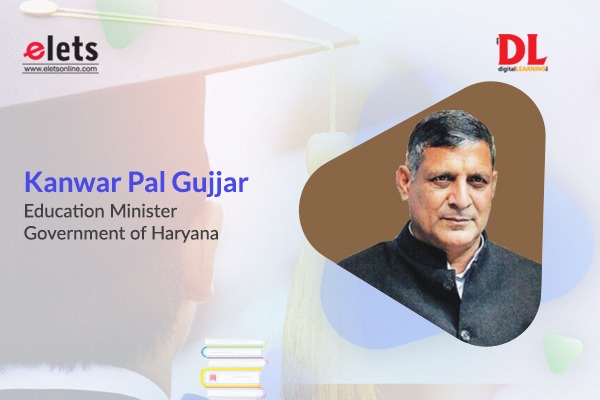
Education has been among the worst impacted sectors by the COVID pandemic and governments across the country came up with technologydriven solutions to ensure continuity of education. The Government of Haryana also took innovative initiatives to keep afloat the crisis-ridden education sector and ensure education to all. Kanwar Pal Gujjar, Education Minister, Government of Haryana talks on the theme at the Elets Education Innovation Summit.
What measures are being put in place by the Education Department of Haryana to augment the quality of school education?
The education sector in India was one of the most affected sectors by the COVID pandemic. However, the Centre and the State governments across the country proactively stepped forward to bring in innovative solutions and the Government of Haryana has been no different. The Government of Haryana has bridged the digital divide in the state’s education and how the government has managed to ensure education to all through digital means, especially during the COVID pandemic. We have Model Sanskriti Schools which are known for their quality education. Increasing the number of these schools had always been on the government’s agenda. Therefore, we opened 113 new Model Sankriti Schools across the state. The Central Board of Secondary Education (CBSE) is a popular choice among the masses in the State, hence we got the institutions affiliated from the board. These schools have set a benchmark. We have witnessed many parents who have withdrawn admissions from private schools and enrolled their kids in these Model government schools. It is a common observation that numerous students are taking coaching classes after school hours but most of those attending government schools are not economically fit enough to afford tuitions. In a bid to address this challenge, the Government of Haryana rolled out Super 100 Programme. Under this, the government provides tuitions to those students who cannot afford private coaching. As many as 25 of these students managed to get admission in IITs and about 72 successfully cleared the NEET examination. Earlier we offered coaching only in two cities, Rewari and Panchkula, but after the success of these we have planned to open up in two more cities, Hisar and Kurukshetra.
How do you plan to implement the changes brought in by the NEP in the education sector?
As far as the New Education Policy (NEP) 2020 is concerned, the Government of India has asked the States to implement the policy completely by 2030. However, the Haryana government has decided to completely shift to the new systems, as per the policy, latest by 2025. Most states are abiding by the scheme to provide free education to students of classes 1 to 8th but the Haryana government has taken a step forward and extended the scheme for students of classes 1 to 12th. Moreover, from 2021, the state government has also extended the associated aid for books, uniform, etc. for students of classes 1 to 12th, this was earlier restricted till class 8th. The NEP 2020 lays emphasis on skill training for students. Aligning with the policy, we have identified 1001 schools for providing skill-based education and training to the students. One of the core objectives of the move is to make students industry ready.
In what ways are you leveraging ICT technologies in Government Schools?
The pandemic and the following nationwide lockdowns brought the entire education sector to a standstill. Therefore, the Government of Haryana took the digital route to rise from the crisis. Recurring efforts were made to kickstart education through digital mediums. Through four of our educational TV channels and the Centre’s Swayamprabha TV channel, we broadcasted recorded lectures so that even the students residing in villages and remote areas could access classes at the specific time. Further, we leveraged Awsar App for holding online tests for the school’s students. Many students attending school do not have a smartphone, tablet or laptop to access the online classes, especially the government school students. This posed a major challenge affronting the state government during the pandemic. Therefore, a decision was taken to distribute tablets to all the students of classes 8th to 12th. The decision has been approved and the government will cater to as many as 8,06,000 students providing them with tablets. Looking at the changing scenario and how education was moving from traditional to digital, many parents and guardians were not able to cope up. Therefore, the government started tele counselling services and opened ‘UmeedKendras’ in 16 districts of across the state. Over 2 lakh students and parent/ guardians leveraged the services.
How do you plan to accelerate the employment scenario in the State & how do you foresee its growth in near future?
In 2020, the state government kept a target of having a college in every 20-km stretch to cut down students’ travel time and expenses. Moving on, in 2021, we have revised the target and decided to have a college in every 15-km stretch. If we talk about employment, earlier there were multiple challenges related to reservations, but the present-day government under the aegis of the Chief Minister Manohar Lal, we have provided jobs to nearly 85,000 students on merit basis. Similarly, for sportspersons, there is a specific policy in place that enables them to get a government job on merit basis without the hassle of running from pillar to post seeking approvals from MLAs.





















